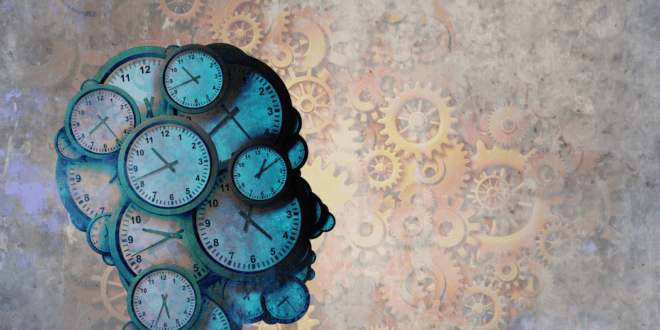After a long research in different libraries and examining various research thesis and studies which share a temporal approach (time), I have highlighted a number of sciences that are closely linked to time programming, whether in terms of their nature or method. Then, I classified them in a list that excluded the sciences related to non-human sides of time, such as: metaphysics time, Mathematics Time, physics time etc. As well as those related to any human science topic tackled away from time programming points of view.
Some of these sciences are:
- Time management science.
- Sociology of leisure.
- Recreational education.
- Time budget.
- Sleep and insomnia studies.
- Chronobiology.
Chronobiology:
Nothing exists in this life outside “time” zone or without rhythm (…). In fact, time that indicates alteration of rhythms and phases started taking place since early life on earth (1). Whether these rhythms are external like the alteration of night and day, tides etc … or internal like: body temperature, heart beats, blood pressure and breathing (2) they represent combined interesting biological studies and highly developed laboratory studies.
Biological rhythm which is subject of chronobiological research conducted on animals as well as plants from smallest living organisms like insects to the most complicated like humans (3).
Concerning man –who is the subject of our research- life sciences research point that every man has his own circadian cycle (4) during approximately 24 hours a day depending on each individual. “circadian rhythms” (5) came from the Latin word “circa” i.e. about (6) and “dian” i.e. day (7).
The early studies of this science were carried out by the French mathematician “Jean Jacques Dortous” in 1729, then developed in the in the 19th century thanks to the efforts of the French doctor “Julien Joseph Virey”, who was the first person to announce circadian rhythm in his research in 1814. Later, – after more than one century- the German biologist “Erwin Buning” stated the terminology of circadian, including less circadian rhythms like “infradian” and “ultradian” (8).
Today, there are more than one thousand articles written about this field issued by scientific journals every year (9) (10). If we try -specifically today- to look for chronobiology in the research of time programming, we will find accurate answers of some questions like:
- What time of the day is man most productive?
- What time of the day is he most unproductive?
- What is the most recommended sleep time?
- What time sleep is not recommended?
Time-programming Researcher will attempt to compare –briefly- between religious scripts –mainly the authentic ones- about man’s activity during night and day time, and the conclusions conducted by contemporary research in the field of chronobiology (11), without having to make any judgment for the scripts whether positive or negative, because authentic scripts remain consistent and correct even if our minds are unable to apprehend them. In the meanwhile, laboratory results do not reach the ultimate level of certainty, and cannot rather turn from assumption and theories into scientific facts.
1 – HALL Edward. T: La danse de la vie, temps culturel, temps vécu: Essais 247, ed. Du Seuil, 1984, p28.
2 – BOUDRIFA Hamou, “Chronobiology”: series of get to know and your body, No. 1, Al Umma Publishing house, Algeria, ed. 1: 1995; P44.
3 – Rassion Pierre: Quand le corps se met á la bonne heure, Science et vie (No 960, Sep 97) p78.
4 – LEISTER: Time Management, Full Guide for Managers under Pressure; P10.
5 – Microsoft corporation: Bookshelf 99, Cd-Rom. Theasaurus, 1999. The Original Roget’s Longman Theasaurus, 1984, Biological Clocks.
6 – Ibid. circa.
7 –El Sherbiny : Al-Araq Wahm Lahu Ilaj = Insomnia is an Illusion that can be Treated, P10.
Pilorge Thierry: Horloge biologique. An a trouvé le ressort: Science et vie (No 916, jan 1994) p78.
8 – Rassion: Quand le corps se met á la bonne heure, p78.
Look
Look –WI VSG : Zaman al-Jism, the idea of time across the history; the book of encyclopedia series, ed 159; National Council of Culture, Arts, and Literature, Kuwait, 1412 A.H./ 1992. P135.
9 – This statistic dates back to 1414 A.H./ 1984,there are maybe even more studies.
10 – HALL: La danse de la vie, p29.
11 – LEISTER: Time Management, Full Guide for Managers under Pressure; P25, 26.
Translated by Toufik Achour.
The Article title in Arabic: علم الساعة البيولوجية
 علم الزمن والوقت
علم الزمن والوقت



